Hometown candidate — DeWine aims for top state office
- Published: November 8, 2018
As the Ohio gubernatorial race comes to a close, Republican candidate Mike DeWine is already looking to get back to a favorite activity after the campaign, win or lose: taking in a movie with his wife at the Little Art Theatre in Yellow Springs.
“There is nothing that I enjoy more than going to the Little Art,” DeWine said in a recent interview. “I will start doing that again.”
In fact, DeWine and his wife, Fran, had their second date at the local theater in the 1960s. Their first was at the former bowling alley on the south end of town.
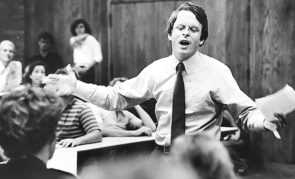
Photos from the political career of local conservative Mike DeWine fill a file folder in the Yellow Springs News archives, although in some cases the context has been lost. At top, DeWine addresses what looks to be a group of students. (YS News Archives)
Currently living outside of Cedarville, Mike and Fran DeWine were both born in Yellow Springs and grew up here. They are parishioners of St. Paul Catholic Church and still have many family members in town.
As the 71-year-old DeWine aims for the state’s highest office, the longtime conservative politician recently reflected on growing up in the left-leaning community of Yellow Springs.
“I was a rather distinct minority,” DeWine recalled of his time in the village, from birth in 1947 until his graduation from Yellow Springs High School in 1965.
But the experience probably helped him hone his debate skills as he hashed out ideological differences with classmates, DeWine added.
DeWine’s time in Yellow Springs was formative in another way, too, instilling in him a respect for the freedom of speech outlined in the First Amendment and an acceptance of diverse views, he said.
“Yellow Springs has always been a community where people of diverse views have been welcomed, and that is something that is a great attribute,” he said.
Yet that same respect for a diversity of opinion is waning on college campuses today, DeWine lamented.
“I think college campuses should be places where all ideas are accepted. That comes from my background in Yellow Springs,” he said.
DeWine also defended his record as a public official for more than 40 years, shared his ideas for the governor’s office and aired his beliefs on a number of issues ranging from the opioid crisis to abortion, Issue 1, the environment, policing and voting rights.
DeWine has served one term as Greene County prosecutor and one term as Ohio state senator, four terms as U.S. congressman, two terms as U.S. senator, one term as lieutenant governor and two terms as attorney general, the office he currently holds.
Now he could become the first governor to hail from the village.
It’s unlikely that DeWine will carry his hometown in next week’s election. He typically loses statewide elections in town by a wide margin, saying of the trend, in 2012, “being the native son only goes so far in Yellow Springs.” Despite that fact, if elected, DeWine said he would be a governor for all Ohioans, including villagers.
“I don’t see it as a partisan job, even though you run as a Republican or Democrat. I will continue to work for the people in Yellow Springs and across the state of Ohio, even if they don’t vote for me.”
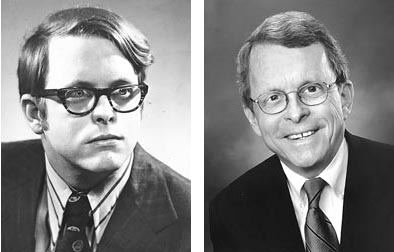
Photos By (L) Axel Bahnsen; (R) John TutuRros, Creative commons license
Mike DeWine is looking to become the first governor to hail from the village. At left, is an Axel Bahnsen portrait of DeWine from 1972, seven years after his graduation from Yellow Springs High School, and at right is a recent campaign photo.
Personal history
DeWine was born to Dick and Jean DeWine in 1947 and grew up on North Winter Street.
Under the heading “New arrivals” in the Jan. 9, 1947, issue of the News, an announcement reads: “Mr. and Mrs. Richard DeWine (Jeannie Liddle), Springfield Pike, are announcing the birth of their first child, Richard Michael, at Springfield City Hospital on Jan. 5.”
DeWine’s grandparents, who all lived on Xenia Avenue, were feed store owners George and Alice DeWine and Antioch English professor Albert Liddle and his wife, Ruth.
DeWine’s family history in the village dates back to the 1840s, when his great-great-great-grandfather came from Ireland during the potato famine to settle in town. The family of his wife, Frances Struewing, also has a long history in the village.
DeWine and Struewing entered first grade together at the brand-new Mills Lawn Elementary School and started dating in high school. They both attended Miami University, marrying midway through college. The couple later settled on Conley Road in Cedarville Township in an historic home built in 1823, a decision that DeWine said doesn’t make them any less connected to the village.
“We live in two worlds — the world of Yellow Springs and the world of Cedarville,” he joked.
In addition to attending mass in Yellow Springs, the DeWines have several family members living in town. That includes Fran’s sister, Cindy Mucher, married to longtime township trustee, Chris Mucher; her brother, Ken Struewing; and mother, Mary Struewing, who is 92. Also living in town is DeWine’s son, John, a local farmer, who married Michele Burns of the Tecumseh Land Trust, and their children‚ DeWine’s grandchildren. In total, Mike and Fran have eight children and 19 grandchildren.
DeWine’s political leanings can be traced to his conservative parents, who frequently talked politics at the dinner table, he has told the News. In the early 1960s, Kieth Howard, then-editor of the News, asked DeWine’s mother, Jean, to write a regular column for the paper, “A View from the Right,” which she did for several years. In the near-weekly, strongly worded column, she parsed the nuances of national policies, from healthcare to farming to labor issues.
In his youth, DeWine worked at the family business, the DeWine-Hamma Seed Company, housed in the present location of Yellow Springs Brewery. Built on the feed store operation of his grandparents, which originally operated in the building that is now the Winds Cafe, it grew to become a large seed company selling to more than 100 grain elevators in four states, according to DeWine. The family also ran the Ohio Twine Company.
As the only surviving son of his parents, DeWine inherited significant family wealth from the companies. According to a 2017 tax return, DeWine earned more than half a million dollars in interest, dividends and capital gains from his investments and family trusts.
DeWine’s parents died four days apart in 2008.
Political career
At age 29, after earning a law degree, DeWine began his political career with a successful run for Greene County Prosecutor in 1976.
He won the race — and the vote of his hometown — but it was the last time DeWine would win the village.
“Former local resident Mike DeWine was the only Republican to sweep the village,” the News reported at the time. DeWine garnered 1,239 votes in Yellow Springs compared to his opponent’s 437.
Asked this week whether the community had more conservative voters back then, DeWine said he didn’t think so. Rather, it was the nature of the office.
“The only thing I can think of is that people didn’t see it as a partisan office,” DeWine said.
Four years later, DeWine was elected to the Ohio State Senate, representing Yellow Springs in Ohio’s 10th Senate district.
Districtwide, “the vote was super-surprisingly one sided,” the News reported, but, locally, “DeWine’s status as a native son couldn’t offset the onus of his party affiliation.” DeWine only won 38 percent in the village, but 64 percent of the vote in the district, which the News reporter noted as a sign of things to come:
“[DeWine’s] landslide victory in what had been anticipated as a close race gives DeWine, at age 33, an obviously bright political future.”
Two years later, voters in Ohio’s 7th District sent DeWine to Washington as their congressman. While winning only 30 percent of the village, DeWine fared far better in town than most Republicans, the News reported.
In May 1983, the News caught up with DeWine in his office, where Horace Champney had come to lobby him about nuclear disarmament after his “locally unpopular” vote of “no” on a nuclear freeze resolution.
“Really I’ve been lobbied more by people from my district than by paid lobbyists,” DeWine told then-News editor Don Wallis.
Other villagers who shared their opinions on the nuclear weapons issue with the congressman were Donna Denman, Hank Dyer, Jean Hudson, Willa Dallas, Gertrude Chasens and David Hergesheimer, while Jim Pitstick had recently approached him on legislation affecting hog farmers, the News reported.
DeWine also told the News that he was “doing what I’ve wanted to do since I was a kid in Yellow Springs.”
“If I’m here for 20 years, it will still be a thrill,” DeWine said.
In fact, DeWine did spend another 20 years as an elected official in Washington over the subsequent 23 years.
After eight years in Congress, DeWine then served as lieutenant governor under Gov. George Voinovich and made an unsuccessful senate run in 1992 against John Glenn before winning a senate seat in 1994, an office he held until 2006, when he was defeated by Sherrod Brown.
In 2011, DeWine was elected attorney general in a close contest with incumbent Richard Cordray, and was re-elected to the position in 2014.
On the issues
By DeWine’s own admission, he knows his stances on many issues are at odds with many villagers. A prime example is abortion.
DeWine said last month he would have signed the Heartbeat Bill vetoed by Gov. John Kasich, which bans abortions after six weeks of pregnancy, before many women even know they are pregnant.
He declined to reaffirm that commitment in a question from the News, instead highlighting his unyielding position on the issue, which diverges from many villagers.
“They’re not going to like my position on that,” DeWine said of abortion. “It’s not going to change. I respect their opinion, but that’s not my opinion.”
He described his philosophy behind the stance.
“I believe one of the essential functions of government is to protect the vulnerable members of society, and that includes the unborn,” DeWine said.
As attorney general, DeWine tried to defend a state law aimed at defunding Planned Parenthood because the health provider performs abortions, but an appellate court ruled that the law was unconstitutional.
In response to a question on voting rights in Ohio, DeWine defended the state’s recent record, saying Ohio has “pretty expansive voting,” including 28 days of early voting. When asked if, as governor, DeWine would keep it that way, he responded, “Absolutely.”
“I don’t foresee that we will be more restrictive,” he said.
But as attorney general, DeWine said he disagreed with a ruling that overturned the Kasich administration’s attempt in 2012 to roll back those 28 days to just three days for military and overseas voters. He appealed the ruling to an appellate court, which upheld the preliminary injunction.
And as secretary of state, DeWine’s running mate, Jon Husted, oversaw a controversial policy of purging Ohio’s voter rolls, which was just upheld by the U.S. Supreme Court, and tried twice to get rid of Sunday voting in Ohio before courts reversed his actions.
DeWine’s plan for the state’s opioid crisis — Ohio is second only to West Virginia in opioid overdose deaths — calls for more focus on education and prevention, including in primary schools statewide. That campaign should focus more on “making good decisions,” and should be done every year in an age-appropriate way, DeWine added.
However, DeWine is opposed to Ohio Issue 1, which would divert those found guilty of low-level nonviolent drug offenses to rehabilitation rather than prison, saying that the threat of jail time is a good motivator for those who are addicted.
“It’s tough love,” DeWine said of that approach, used by many of the state’s drug courts. Those courts have been “a great success,” he added.
“We have seen a lot of people who have been able to get help who didn’t want to get help or think they wanted to get help until they are arrested for the possession of drugs,” DeWine said.
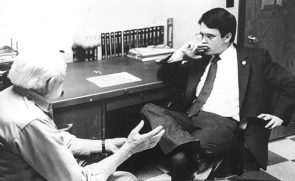
Yellow Springs resident Horace Champney lobbies DeWine about nuclear disarmament.
“The whole world is in your hands,” Champney told DeWine.
DeWine may be more aligned with Yellow Springs voters on some environmental issues, such as expanding state parks and addressing environmental threats to Lake Erie, he said. DeWine’s appreciation of natural areas started with his time in Glen Helen as a youth, including at school camps in the Glen, he added.
Asked about allowing oil drilling and natural gas fracking in Ohio’s state parks, DeWine said he “can’t envision it.”
“I think the state parks are a jewel of the state,” he said.
Finally, DeWine declined to explain decisions as attorney general related to the shooting of John Crawford in a Beavercreek Walmart, including the delayed public release of security camera footage and other appeals from activists when charges were not pursued against either the police officer who killed Crawford or a 911 caller for making false claims.
“Ultimately, if there were criminal charges, the grand jury has to decide it,” DeWine said. Alluding to the News’ coverage of the issue, he added, “I read the paper. I know all of the different opinions.”
DeWine went on to detail policies he put in place as attorney general aimed at improving police training with regard to implicit racial bias and dealing with those who have mental illnesses.
“These are constructive things we have done that, in the long run, will make a big difference,” DeWine said.
Race for governor
DeWine is facing his former opponent, Democrat Richard Cordray, in the gubernatorial race, which, as of Oct. 30, was officially a toss-up and too close to call, according to several political websites. Two other candidates are on the ballot: Travis Irvine of the Libertarian Party and Constance Gadell-Newton of the Green Party.
Through Sept. 30, DeWine had raised $17 million to Cordray’s $13 million.
President Trump, with whom DeWine appeared in an August rally ahead of a special election, plans to visit Ohio on the eve of the election.
After DeWine’s win in the primary, Trump weighed in on the race in a tweet: “Congratulations to Mike Dewine on his big win in the Great State of Ohio. He will be a great Governor with a heavy focus on HealthCare and Jobs. His Socialist opponent in November should not do well, a big failure in last job!”
Cordray’s job in question was as the head of the Consumer Financial Protection Bureau, a position he was appointed to by President Obama, but in which he was recently thwarted by Republican lawmakers.
In addition to his two years as attorney general, Cordray has served as Ohio treasurer and state representative.
The Cordray campaign did not respond to News requests for an interview.
Cordray and DeWine have clashed on healthcare more than any other issue. Although DeWine claims to support coverage for pre-existing conditions, citing bills he supported as a congressman, on his first day as attorney general he joined a multi-state legal challenge to the Affordable Care Act, and in the Republican gubernatorial primary said he would end the related Medicaid expansion in Ohio. More recently, DeWine has said he wants to add work requirements to make the Medicaid expansion financially sustainable.
Gadell-Newton, the Green Party candidate, is an attorney who has come out opposed to hydraulic fracturing and in favor of marijuana legalization, civil liberties and criminal justice reform. Her campaign has also emphasized that the party needs to receive three percent of the vote in the election or it would lose its recognized party status and, in the future, its candidates would be listed on the ballot as independent.
Irvine, the Libertarian, is in favor of marijuana legalization and Ohio Issue 1, as well as gun rights and tax reforms that lessen the load on small businesses.
The Yellow Springs News encourages respectful discussion of this article.
You must login to post a comment.
Don't have a login? Register for a free YSNews.com account.


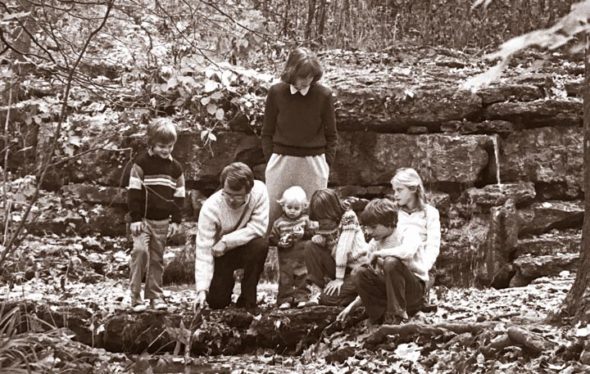

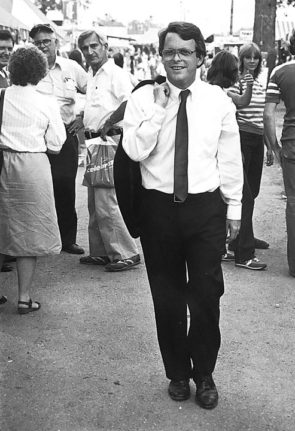








No comments yet for this article.